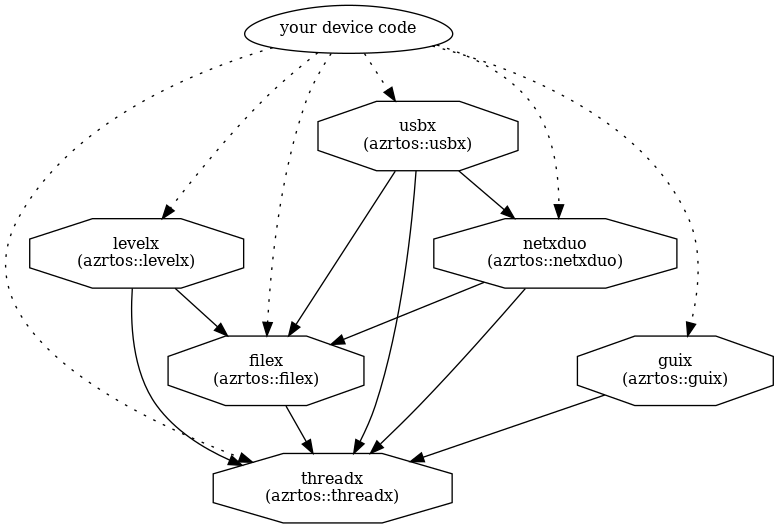This is a high-performance, file allocation table (FAT)-compatible file system that’s fully integrated with Azure RTOS ThreadX and available for all supported processors. Like Azure RTOS ThreadX, Azure RTOS FileX is designed to have a small footprint and high performance, making it ideal for today’s deeply embedded applications that require file management operations. FileX supports most physical media, including RAM, Azure RTOS USBX, SD CARD, and NAND/NOR flash memories via Azure RTOS LevelX.
Documentation for this library can be found here: http://docs.microsoft.com/azure/rtos/filex
FileX supports the Microsoft exFAT file system format using the FX_ENABLE_EXFAT define. See common/inc/fx_user_sample.h for more information about configuration of FileX.
Your use of exFAT technology in your products requires a separate license from Microsoft. Please see the following link for further details on exFAT licensing: https://www.microsoft.com/en-us/legal/intellectualproperty/tech-licensing/programs?activetab=pivot1:primaryr5
The main components of Azure RTOS are each provided in their own repository, but there are dependencies between them--shown in the following graph--that are important to understand when setting up your builds.
Install the following tools:
- CMake version 3.0 or later
- GCC compilers for arm-none-eabi
- Ninja
$ git clone https://github.com/azure-rtos/filex.gitEach component of Azure RTOS comes with a composible CMake-based build system that supports many different MCUs and host systems. Integrating any of these components into your device app code is as simple as adding a git submodule and then including it in your build using the CMake command add_subdirectory().
While the typical usage pattern is to include threadx into your device code source tree to be built & linked with your code, you can compile this project as a standalone static library to confirm your build is set up correctly.
$ cmake -Bbuild -DCMAKE_TOOLCHAIN_FILE=cmake/cortex_m4.cmake -GNinja .
$ cmake --build ./buildNOTE: You will have to take the dependency graph above into account when building anything other than threadx itself.
The master branch has the most recent code with all new features and bug fixes. It does not represent the latest General Availability (GA) release of the library.
Each official release (preview or GA) will be tagged to mark the commit and push it into the Github releases tab, e.g. v6.0-rel.
- cmake
- common
- inc
- src
- ports
- cortex_m0/gnu
- inc
- src
- cortex_m3/gnu
- inc
- src
- cortex_m4/gnu
- inc
- src
- cortex_m7/gnu
- inc
- src
- samples
Azure RTOS provides OEMs with components to secure communication and to create code and data isolation using underlying MCU/MPU hardware protection mechanisms. It is ultimately the responsibility of the device builder to ensure the device fully meets the evolving security requirements associated with its specific use case.
License terms for using Azure RTOS are defined in the LICENSE.txt file of this repo. Please refer to this file for all definitive licensing information. No additional license fees are required for deploying Azure RTOS on hardware defined in the LICENSED-HARDWARE.txt file. If you are using hardware not defined in the LICENSED-HARDWARE.txt file or have licensing questions in general, please contact Microsoft directly at https://azure-rtos.ms-iot-contact.com/
If you encounter any bugs, have suggestions for new features, or if you would like to become an active contributor to this project, please follow the instructions provided in the contribution guideline for the corresponding repo.
For basic support, click Issues in the command bar or post a question to Stack Overflow using the threadx and azure-rtos tags.
Professional support plans (https://azure.microsoft.com/en-us/support/options/) are available from Microsoft.
The following are references to additional Azure RTOS and Azure IoT in general:
| Azure RTOS Documenation and Guides: | https://docs.microsoft.com/azure/rtos |
| Azure RTOS Website: | https://azure.microsoft.com/services/rtos/ |
| Azure RTOS Sales Questions: | https://azure-rtos.ms-iot-contact.com/ |
| For technical questions check out Microsoft Q/A for Azure IoT: | https://aka.ms/QnA/azure-rtos |
| Internet of Things Show for latest announcements and online training: | https://aka.ms/iotshow |
| IoT Tech Community: | https://aka.ms/community/azure-rtos |
